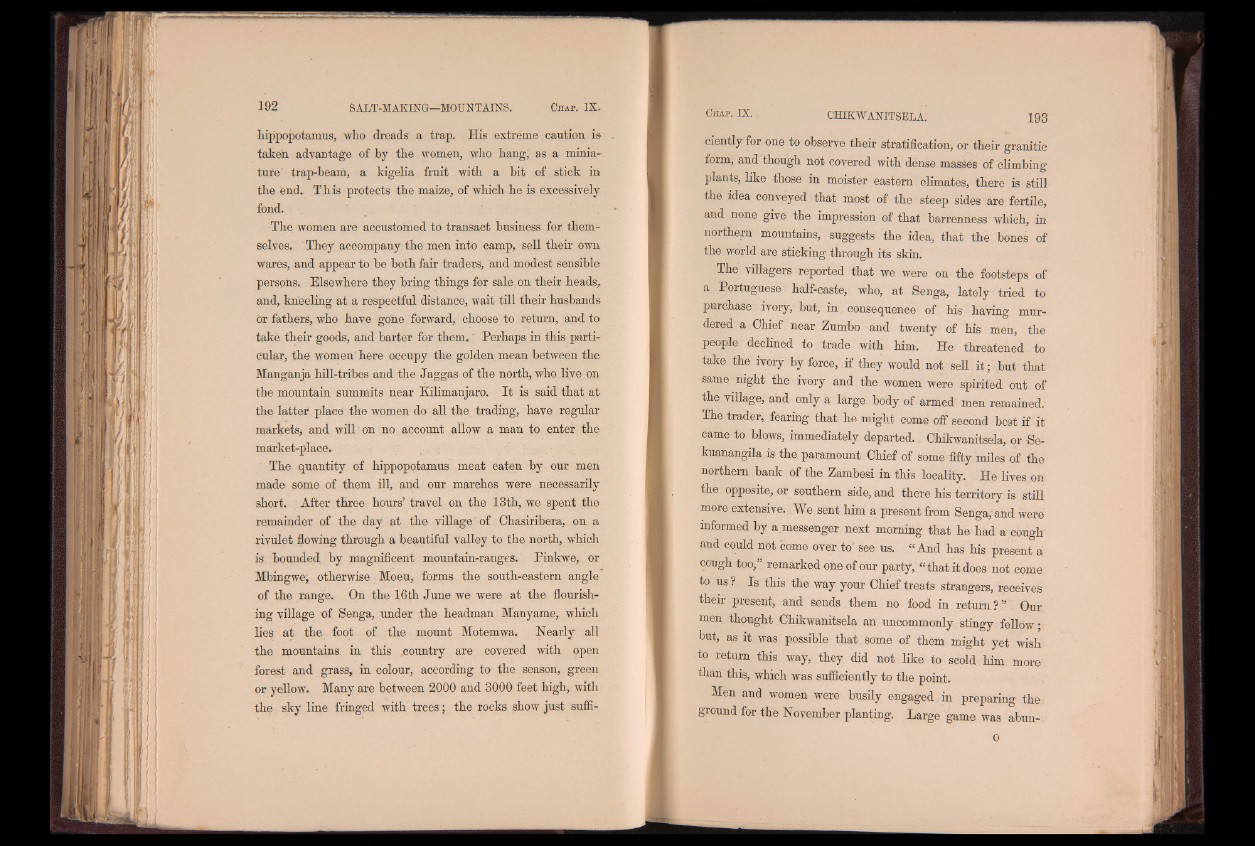
hippopotamus, who dreads a trap. His extreme caution is
taken advantage of by the women, who hang; as a miniature'
trap-beam, a kigelia fruit with a bit of stick in
the end. This protects the maize, of which he is excessively
fond.
The women are accustomed to transact business for themselves,
They accompany the men into camp, sell their own
wares, and appear to be both fair traders, and modest sensible
persons. Elsewhere they bring things for sale.on their heads,
and, kneeling at a respectful distance, wait till their husbands
or fathers, who have gone forward, choose to return, and to
take their goods, and barter for them. Perhaps in this particular,
the' women here occupy the golden mean between the
Manganja hill-tribes and the Jaggas of the north, who live on
the mountain summits near Kilimanjaro. I t is said that at
the latter place the women do all the trading, have regular
markets, and will on no account allow a man to enter the
market-place.
The quantity of hippopotamus meat eaten by our men
made some of them ill, and our marches were necessarily
short. After three hours’ travel on the 13th, we spent the
remainder of the day at the village j of Chasiribera, on a
rivulet flowing through a beautiful valley to the north, which
is bounded by magnificent mountain-ranges. Pinkwe, or
Mbingwe, otherwise Moeu, forms the south-eastern angle
of the range. On the 16th June we were at the flourishing
village of Senga, under the headman Manyame, which
lies at the foot of the mount Motemwa. Nearly all
the mountains in this country are covered with open
forest and grass, in colour, according to the season, green
or yellow. Many are between 2000 and 3000 feet high, with
the sky line fringed with trees; the rocks show just sufficiently
for one to observe their stratification, or their granitic
form, and though not covered with dense masses of climbing
plants, like those in moister eastern climates, there is still
the idea conveyed that most of the steep sides are fertile,
and none give the impression of that barrenness which, in
northern mountains, suggests the idea, that the bones of
the world are sticking through its skin
The villagers reported that we were on the footsteps of
a Portuguese half-caste, who, at Senga, lately tried to
purchase ivory, but, in consequence of his having murdered
a Chief near Zumbo and twenty of his men, the
people declined to trade with him. He threatened to
take the ivory by force, if they would not sell it; .but that
same night the ivory and the women were spirited out of
the village, and only a large body of armed men remained.
The trader, fearing that he might come off second best if it
came to blows, immediately departed. Chikwanitsela, or Se-
kuanangila is the paramount Chief of some fifty miles of the
northern bank of the Zambesi in this locality. He lives on
the opposite, or southern side, and there his territory is still
more extensive. We sent him a present from Senga, and were
informed by a.messenger next morning that he had a cough
and could not come over to see us. “And has his present a
cough too,” remarked one of our party, “ that it does not come
to us ? Is this the way your Chief treats strangers, receives
their present, and sends them no food in return ? ” Our
men thought Chikwanitsela an uncommonly stingy fellow;
but, as it was possible that some of them might yet wish
to return this way, they did not like to scold him more
than this, which was sufficiently to the point.
Men and women were busily engaged in preparing the:
ground for the November planting. Large game was abun